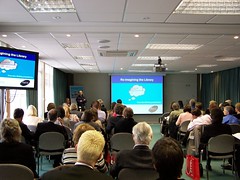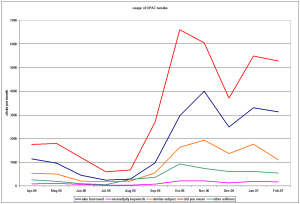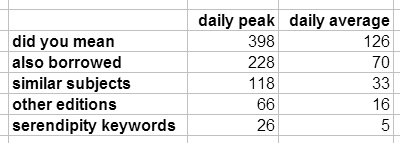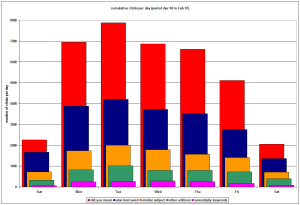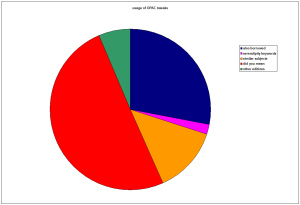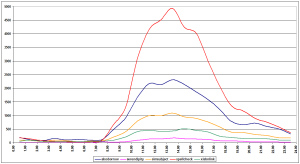Wow — the OPAC survey has now had over 650 responses! I really can’t say this enough times, but thanks to everyone who has responded so far.
http://www.daveyp.com/files/stuff/opac.html
The survey has already been posted on the SirsiDynix Horizon and IPAC mailing lists, but it would be great to get more responses from the users of other systems. If anyone is willing to post a link to the survey in a mailing list for any of the other systems, then please do.
I’m planning to close the survey on Saturday 14th April and will post the main results on (or before) April 17th. Quite a bit of the data will be included in the presentation I’m giving at LiS 2007 on the 18th.
The full results from the survey will be published in an informal report sometime around the middle of May. This report will include:
- all of the comments from the respondents
- tables of the data, broken down by multiple criteria
- lots of pretty graphs(!)
- conclusions and predictions based on the data
The comments alone currently run to nearly 40 pages and provide a unique insight into our love/hate relationship with the OPAC.
As a taster of things to come, here are some breakdowns taken from the responses to date…
Countries represented
There have been responses from virtually every corner of the globe and the current breakdown is as follows (based on IP address of respondent):
- Australia — 21
- Canada — 41
- Germany — 2
- Greece — 2
- Hong Kong — 2
- Ireland — 3
- New Zealand — 8
- Sweden — 4
- UK — 155
- USA — 408
China, Denmark, Italy, Lebanon, Luxembourg, Netherlands, Peru, and Spain have all had 1 respondent each.
I’ve yet to do a full breakdown of results by all countries, but here are some of the facts for the countries where there have been at least 10 responses:
- Canadians are the least happy with their OPACs (4.37 out of 10) whilst the UK is the happiest (5.81 out of 10)
- The UK respondents generally think the OPAC features listed in the survey are less important than the rest of the world does
- Australians suffer the most from “OPAC envy” with 86% saying they’d experienced it (or perhaps Aussies are the most honest people in the world?)
- Respondents from the UK were the least likely to experience envy with just 72% admitting to it
- Australians are the most likely to offer OPAC training to their users (81%) and Canadians the least likely (61%)
Library type
As mentioned before, I’ve kicked myself for not asking respondents to say what type of library they are from. However, I added the question to the survey a couple of days ago and nearly 160 respondents have replied since then. The breakdown is:
- academic — 92
- public — 45
- other — 14
- school/K12 — 6
It would be great to get some more responses to bump those figures up, but here’s how academic and public libraries compare so far:
- publics rate the “people who borrowed this” feature more highly (7.6 out of 10 compared to 6.2 for academics)
- publics rate enriched content (book covers, etc) slightly more highly (8.9 out of 10 compared to 8.5 for academics)
- academics rate facetted browsing more highly (8.1 out of 10 compared to 7.3 for publics)
- publics rate user supplied comments much more highly (7.3 out of 10 compared to 5.9 for academics)
- publics rate user supplied ratings much more highly (7.1 out of 10 compared to 5.3 for academics)
- academics are much more likely to offer OPAC training to their users (74% compared to 53% of publics)
…apart from the above, the responses from public libraries and academic ones have been very similar.
OPAC features
I’ve got some really exciting data here that I’m going to hold off from posting it all until the survey closes (I’m such a tease!).
If you take the Crossing the Chasm adoption curve and apply the boundary values from the more well known Technology Adoption LifeCycle (E.M. Rogers)…

- Innovators — 2.5%
- Early Adopters — 13.5%
- Early Majority — 34%
- Late Majority — 34%
- Laggards — 16%
…then the current state of play of the 10 OPAC features in the survey (calculated from the number of respondents who said that they had already implemented the feature) is:
Innovators:
- OPACs that make personalised suggestions (like Amazon does)
- “people who borrowed this” suggestions
Early Adopters:
- user supplied tagging
- facetted browsing
- user supplied comments
- user supplied ratings
- “did you mean” spelling suggestions
- RSS feeds
- embedding the OPAC into other places
Early Majority:
- enriched content (book covers, etc)
…in other words, only enriched content has jumped “the chasm” into mainstream acceptance.
If we assume that everyone who said that they were planning to implement a feature soon actually does so before the end of 2007, then 3 of the 7 features currently in the Early Adopters group will also have jumped the chasm to reach Early Majority (and mainstream acceptance?) by the start of 2008 — can you guess which 3 they are?
Also, if we continue with that assumption, the 2 features currently in the Innovators group will have moved into the Early Adopters group.
So, if you are craving these “more cowbell” features, it would appear that all of them are taking little baby steps towards an OPAC near you. How long each of them will take to arrive is the next big question and I’ll be offering some informed speculation based on the data once the survey has closed!


